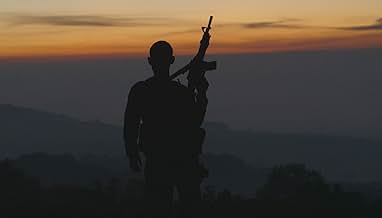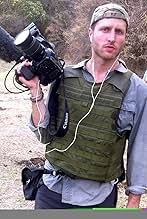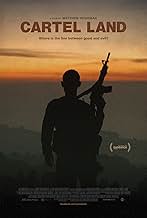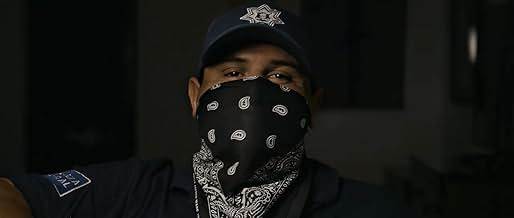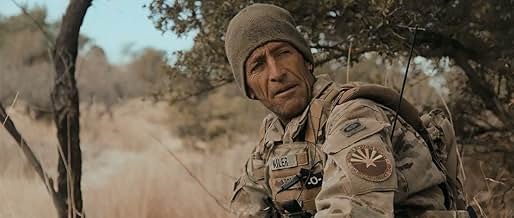NOTE IMDb
7,3/10
19 k
MA NOTE
Ajouter une intrigue dans votre langueFilmmaker Matthew Heineman examines the state of the ongoing drug problem along the U.S.-Mexican border.Filmmaker Matthew Heineman examines the state of the ongoing drug problem along the U.S.-Mexican border.Filmmaker Matthew Heineman examines the state of the ongoing drug problem along the U.S.-Mexican border.
- Nommé pour 1 Oscar
- 19 victoires et 38 nominations au total
Nicolás Sierra
- Self
- (as as Nicolás Sierra 'El Gordo')
Alfredo Castillo Cervantes
- Self - Mexican political
- (as Alfredo Castillo)
María Imilse Arrué
- Self
- (as María Imilse)
Avis à la une
Although he hasn't made the technical "best" documentary of the year), it's hard to see a documentary filmmaker who stuck his neck out more, literally, than Matthew Heienman to make Cartel Land (maybe Joshua Oppenheimer, in his way, put himself in danger to make his Indonesia docs, but he wasn't caught up in anything like this). He puts himself into some incredibly dangerous scenes, and from what I could tell it's not at all the case of him trying to get some extra dramatics or tension where there is none. On the contrary he follows the Mexican group the Autodefensas (at times when they are in the midst of shoot-outs and enemy fire) in their rise to become a major presence in Michoacan, Mexico, as well as how they became corrupted by the very forces they are/were up against.
So points automatically have to go to the director for that, and he clearly is passionate about this issue - and as the wisest choice he doesn't put himself into it in the slightest (very much the objective, here and there more like a war cine-journalist when with his camera on the streets and roads and interrogation rooms). But I do wish that he had stuck to the story of the Doctor Meirelles and his group, as he and the world that he's in is just more captivating and stronger as a story of a rise and fall than that of the American who is supposed to be the 'counter-point' or other side example.
His story, as a man who has split off from society (in part due to the 2008 economic collapse, among other issues), and formed a small would be (?) militia patrolling parts of the Mexican border for immigrants, could be compelling. But it's not even so much that the contrast or point-counter-point of him and the Doctor might not have some interest (I think the point ultimately is one guy really is fighting for his life and for others, and the other is more about rounding up illegal immigrants where, for some reason, border patrol doesn't seem to be around), it's more a flaw of filmmaking. I think that if Heineman had kept it all down as a story of the Autodefensas, he would have a full movie to tell, and indeed the two places - on the US/Mexico border and Michoacan, which is over a thousand miles away to the south - are so far apart that they don't have much relation to one another exactly. Of course the cartels are a problem in one spot as much as the other, yet on a simple film editing level, it throws off the balance.
This could have been two documentaries, perhaps, again to bring up Oppenheimer, as compliments to one another. It's a shame that it doesn't work much better, since there's a lot of potent, incendiary stuff here. When Cartel Land works best, it all but indicts a country for not doing far more than it should, or what the president or government claims to do (again, this is the documentary, I'd have to read up more to know if the filmmaker doesn't show more sides to what the police or other military forces may or may be doing for the Autodefensas to rise up in the first place), and that corruption and crime becomes just a fact of life. It displays another form of terrorism that seems not as apparent as, say, Islamic fundamentalism but is no less a threat to the people where it takes place, though oddly enough what the film shows is the danger of vigilantism as well.
So points automatically have to go to the director for that, and he clearly is passionate about this issue - and as the wisest choice he doesn't put himself into it in the slightest (very much the objective, here and there more like a war cine-journalist when with his camera on the streets and roads and interrogation rooms). But I do wish that he had stuck to the story of the Doctor Meirelles and his group, as he and the world that he's in is just more captivating and stronger as a story of a rise and fall than that of the American who is supposed to be the 'counter-point' or other side example.
His story, as a man who has split off from society (in part due to the 2008 economic collapse, among other issues), and formed a small would be (?) militia patrolling parts of the Mexican border for immigrants, could be compelling. But it's not even so much that the contrast or point-counter-point of him and the Doctor might not have some interest (I think the point ultimately is one guy really is fighting for his life and for others, and the other is more about rounding up illegal immigrants where, for some reason, border patrol doesn't seem to be around), it's more a flaw of filmmaking. I think that if Heineman had kept it all down as a story of the Autodefensas, he would have a full movie to tell, and indeed the two places - on the US/Mexico border and Michoacan, which is over a thousand miles away to the south - are so far apart that they don't have much relation to one another exactly. Of course the cartels are a problem in one spot as much as the other, yet on a simple film editing level, it throws off the balance.
This could have been two documentaries, perhaps, again to bring up Oppenheimer, as compliments to one another. It's a shame that it doesn't work much better, since there's a lot of potent, incendiary stuff here. When Cartel Land works best, it all but indicts a country for not doing far more than it should, or what the president or government claims to do (again, this is the documentary, I'd have to read up more to know if the filmmaker doesn't show more sides to what the police or other military forces may or may be doing for the Autodefensas to rise up in the first place), and that corruption and crime becomes just a fact of life. It displays another form of terrorism that seems not as apparent as, say, Islamic fundamentalism but is no less a threat to the people where it takes place, though oddly enough what the film shows is the danger of vigilantism as well.
This moving and compelling documentary paints a vivid picture of the tragic situation involving the cartels, police, military, government, and citizens of Mexico. This story is too little known north of the border, and that's why this documentary is important and should be seen. The director's bravery in obtaining some amazing footage is to be commended.
However, in my opinion the filmmaker has made a serious and even offensive misstep in trying to create a parallel between the vigilantes of the Autodefensas and the vigilantes of the Arizona Border Recon. Quoting from the doc's website, the premise is that these groups "vie to bring their own brand of justice to a society where institutions have failed."
It's abundantly clear that in Mexico, to put it as neutrally as possible, institutions (government, police, military) have failed to protect citizens from cartel- sponsored violence. The tragic consequences of this failure are made disturbingly real in the film.
However, the idea that U.S. government, police, and military have failed to protect the citizens of Arizona from cartel-sponsored violence is just absurd. Worse, by comparing a flawed Mexican leader who is apparently sincerely trying to address a horrific situation to a flawed American "leader" who is off on some crackpot right-wing conspiracy theory where the danger is mostly in his head, the film ends up insulting the actual pain and suffering experienced by the people of Mexico. However much the Arizona guy wants to say he's really focusing on the cartel's activity in the Arizona desert (how does that work, again?), his true motive is to stop people from crossing the border because he has an anti-immigration ax to grind. However you feel about immigration, U.S.-based anti- immigrant vigilantism is not analogous to the motives or efforts of the Autodefensas. Comparing the two insults the Mexican people's suffering and the Autodefensas courage, however flawed their leaders and unsuccessful their efforts may be.
If the filmmaker wanted to bring in important information from the U.S. side of the border, he might have tried providing some information about how our government's "War on Drugs" has paralleled the cartel's rise (coincidence?), or the blood that's on our hands because we're the ones buying the drugs.
Instead, he makes a false parallel with a group of anti-immigrant wingnuts. If you want to make a documentary to show that anti- immigrant wingnuts are people too, go ahead, but don't try to compare the Arizona Border Recon to the Autodefensas. That's not an intellectually fascinating parallel, as the filmmaker apparently believes. It's just pretentious and, really, disgusting.
However, in my opinion the filmmaker has made a serious and even offensive misstep in trying to create a parallel between the vigilantes of the Autodefensas and the vigilantes of the Arizona Border Recon. Quoting from the doc's website, the premise is that these groups "vie to bring their own brand of justice to a society where institutions have failed."
It's abundantly clear that in Mexico, to put it as neutrally as possible, institutions (government, police, military) have failed to protect citizens from cartel- sponsored violence. The tragic consequences of this failure are made disturbingly real in the film.
However, the idea that U.S. government, police, and military have failed to protect the citizens of Arizona from cartel-sponsored violence is just absurd. Worse, by comparing a flawed Mexican leader who is apparently sincerely trying to address a horrific situation to a flawed American "leader" who is off on some crackpot right-wing conspiracy theory where the danger is mostly in his head, the film ends up insulting the actual pain and suffering experienced by the people of Mexico. However much the Arizona guy wants to say he's really focusing on the cartel's activity in the Arizona desert (how does that work, again?), his true motive is to stop people from crossing the border because he has an anti-immigration ax to grind. However you feel about immigration, U.S.-based anti- immigrant vigilantism is not analogous to the motives or efforts of the Autodefensas. Comparing the two insults the Mexican people's suffering and the Autodefensas courage, however flawed their leaders and unsuccessful their efforts may be.
If the filmmaker wanted to bring in important information from the U.S. side of the border, he might have tried providing some information about how our government's "War on Drugs" has paralleled the cartel's rise (coincidence?), or the blood that's on our hands because we're the ones buying the drugs.
Instead, he makes a false parallel with a group of anti-immigrant wingnuts. If you want to make a documentary to show that anti- immigrant wingnuts are people too, go ahead, but don't try to compare the Arizona Border Recon to the Autodefensas. That's not an intellectually fascinating parallel, as the filmmaker apparently believes. It's just pretentious and, really, disgusting.
This documentary is about Mexico and cartels, but it is also about vigilantism in general. Is it OK to take the law into your own hands? Does this freedom corrupt? The documentary explores two (related) instances of vigilantism, and it does so in a critical, but nuanced way. It reflects upon the motives of the people involved, and their situation. This exploration is what really makes this documentary great. It throws some light on the situation in Mexico in a way that is both thrilling and heartbreaking - but by focusing on the acts of the vigilantes, the documentary becomes timeless.
The people behind this went to great lengths to get some really(!) impressive footage. How they convinced people involved to let them film all of this is beyond me.
A warning though: There were some scenes here where I had to look away because of the images shown.
The people behind this went to great lengths to get some really(!) impressive footage. How they convinced people involved to let them film all of this is beyond me.
A warning though: There were some scenes here where I had to look away because of the images shown.
Review: What a brilliant documentary! It really did seem like it was a feature film because it's full of action and intense drama. The director, Matthew Heineman, was lucky to gain the trust of Dr. José Mireles and Tim "Nailer" Foley, to go behind the scenes and film the gruesome problems in the Mexican state of Michoacan and the Arizona border, which is used by the drug cartels to bring drugs into America. Both stories involve heavy corruption, kidnap, horrifying murder, rape and black mail. Matthew put together enough material to tell the terrifying story about the drug cartels who will kill anybody who step in there way. Tim is an ex veteran who suffered abuse from his father and left home at the early age of 15. After working in various jobs and losing his house due to the credit crunch, he started to work alongside immigrants, who worked illegally and didn't pay any taxes. He then decided to use his savings to put together an elite force called the Arizona Border Recon in Arizona's Altar Valley, to stop the drug cartels from bringing there drugs into America and to stop the war causing any problems across the border. His small force use heavy artillery and patrol during day and night to protect his home and infiltrate the cartels various methods of trafficking drugs. As there isn't any laws to protect them, they basically take matters into there own hands and risk there life's for there country and to make sure that things don't get out of hand. While Tim is battling against the cartels, who are using the newest technology to communicate, Dr. José Mireles is also battling against the cartels but his war is to protect Michoacan and to gain control of the various towns which have many violent gang members, called the Knight Templars, who are causing havoc in there communities. After giving speeches in the various towns, he manages to put together a force called the Autodefensas, who use heavy artillery and group together in numbers to get the perpetrators out of the many villages. He successfully cleans up many of the small towns and he becomes highly respected around Michoacan. He then ends up in a plane crash, which paralysed a side of his face and seriously damages his back, so he takes time out from the Autodefensas and goes into hiding because he doesn't know if the crash was a hit from the cartels. On the anniversary of the Autodefensas, José comes out of hiding and takes back control of his elite force but everything has got out of control and a lot of the Autodefensas are using there powers to do bad things. As they haven't got the right to have guns and apply force around Michoacan, the government step in and build there own force, which pushes José out of control. All of his fellow workers join the government force because they are allowed to use guns by law and Jose's life becomes in danger because he has broken so many laws when he was in control. When they eventually catch up with José, they put him in a Federal Centre for Social Re-adaptation in Hermosillo, Sonora. Although he still gains support from the villagers, he has basically become a political prisoner who is kept behind bars to silence him and take full control of his elite force. It has all the makings for a brilliant film but as this is a documentary about true events, I found it thrilling and quite emotional, especially when you hear what some of the community went through. The story that was told by the lady who watched her husband being burnt to death, was awful and it really shows how far these cartels are willing to go, to bring fear into people's life's. There also are some intense shoot-outs which must have been extremely scary for the director, who was in the heart of the action. Anyway, this movie definitely gave a graphic insight into a world which I totally didn't know existed and right from the beginning, when the members of the cartels are cooking the "Meth", I was glued to the TV until the end. Great!
Round-Up: This brilliant documentary was put together by Matthew Heineman who brought you Overcoming The Storm, which is about several residents returning to there homes in New Orleans after hurricane Katrina, Our Time, which is about 4 youths who travel across America to ask there peers serious questions about life in America today and Escape Fire: The Fight Of Rescue American Healthcare, which uncovers the U.S. Healthcare systems true design. I personally would watch Matthew's other documentaries because he really did get to the heart of the problem with this movie and put his life on the line, to the point were he didn't put on his bullet proof vest during one of the shoot-outs because he wanted to catch all of the action on camera. The movie did make me investigate what really did happen to José, who is still in prison but I did find it a bit weird that no one looked into the camera during the scenes in the various villages and the shoot-outs. That did make me question if the documentary was real but when I watched the bonus material on the DVD, I realised that these events really did happen. The cartels value for life did shock me and I can't imagine how it must be to live your life in fear, 24 hours a day. I think you can tell that I really enjoyed this film and I hope that it gets the recognition that it deserves.
Budget: N/A Worldwide Gross: $1.1million
I recommend this movie to people who are into their documentary/action/drama movies about a physician in Michoacan, Mexico, who leads a citizen uprising against the drug cartel that has wreaked havoc on the region for years. 8/10
Round-Up: This brilliant documentary was put together by Matthew Heineman who brought you Overcoming The Storm, which is about several residents returning to there homes in New Orleans after hurricane Katrina, Our Time, which is about 4 youths who travel across America to ask there peers serious questions about life in America today and Escape Fire: The Fight Of Rescue American Healthcare, which uncovers the U.S. Healthcare systems true design. I personally would watch Matthew's other documentaries because he really did get to the heart of the problem with this movie and put his life on the line, to the point were he didn't put on his bullet proof vest during one of the shoot-outs because he wanted to catch all of the action on camera. The movie did make me investigate what really did happen to José, who is still in prison but I did find it a bit weird that no one looked into the camera during the scenes in the various villages and the shoot-outs. That did make me question if the documentary was real but when I watched the bonus material on the DVD, I realised that these events really did happen. The cartels value for life did shock me and I can't imagine how it must be to live your life in fear, 24 hours a day. I think you can tell that I really enjoyed this film and I hope that it gets the recognition that it deserves.
Budget: N/A Worldwide Gross: $1.1million
I recommend this movie to people who are into their documentary/action/drama movies about a physician in Michoacan, Mexico, who leads a citizen uprising against the drug cartel that has wreaked havoc on the region for years. 8/10
"Carte Land" (2015 release; 100 min.) is a documentary that examines what is happening in the Mexican state of Michoacán, in south-west Mexico (about 1,000 miles from the US border), and in a separate story, we also take a look at what some people are doing at the Arizona border with Mexico. As the documentary opens, we see Mexican guys cooling up meth somewhere in Michoacán. Comments one: "We know we do harm, but we come from poverty". Then we get to know a woman, who lost 13 (!) family members, all brutally murdered by the cartel when their employer (owner of a lime orchard) couldn't pay the cartel, so they shot his employees as revenge. Then we get to know Dr. Mireles, a Michoacán-based physician who is sick and tired of the violence, and realizing that the official authorities will not/cannot do anything, he decides to start the Autodefensas, a grass roots movement to claim back the streets and towns of Michoacán.
Couple of comments: first, this is another documentary from producer-director Matthew Heineman, and with this latest, he hits the bull's eye. The situation in the Mexican state of Michoacán is so bad that people are outright desperate for relief, ANY relief. There is an astonishing scene that plays out in the city of Apo, where the Autodefensas capture several cartel members. Then the Mexican Army comes sweeping in, and tries to disarm the Autodefensas (yes! not the cartel). The town's population quickly gathers and essentially howls the Army back out of town. Jaw-dropping. There are other such scenes in this riveting, and revolting, documentary. With revolting, I refer of course to the deplorable situation the Mexican people find themselves in, left to their own devices with the state or federal authorities pretty much absent. Beware, on several occasions there is shocking forage or pictures, and this documentary is most certainly not for the faint of heart. Second, the 'parallel' story of the Arizona Border Recon, with veterans taking it on themselves to patrol the border to keep migrants out, falls utterly short and frankly looks a bit silly as compared to the stuff we see happening in Michoacán. It would've made the documentary even better by simply focusing on what is happening on the ground in Mexico. But even with that unnecessary side story, "Cartel Land" is an unforgettable documentary.
"Cartel Land" made quite a splash at the Sundance Film Festival earlier this year, and when out of the blue this showed up at my local art-house theater here in Cincinnati this weekend, I couldn't believe my luck and went to see it right away. The matinée screening where I saw this at was a private affair, as in: I literally was the only person in the theater. That is a darn shame, as "Cartel Land" makes for compelling, if at times uncomfortable, viewing. If you get an opportunity to check this out and draw your own conclusions, be it at the theater, on Amazon Instant Video, or eventually on DVD/Blu-ray, do not miss it! "Cartel Land" is HIGHLY RECOMMENDED!
Couple of comments: first, this is another documentary from producer-director Matthew Heineman, and with this latest, he hits the bull's eye. The situation in the Mexican state of Michoacán is so bad that people are outright desperate for relief, ANY relief. There is an astonishing scene that plays out in the city of Apo, where the Autodefensas capture several cartel members. Then the Mexican Army comes sweeping in, and tries to disarm the Autodefensas (yes! not the cartel). The town's population quickly gathers and essentially howls the Army back out of town. Jaw-dropping. There are other such scenes in this riveting, and revolting, documentary. With revolting, I refer of course to the deplorable situation the Mexican people find themselves in, left to their own devices with the state or federal authorities pretty much absent. Beware, on several occasions there is shocking forage or pictures, and this documentary is most certainly not for the faint of heart. Second, the 'parallel' story of the Arizona Border Recon, with veterans taking it on themselves to patrol the border to keep migrants out, falls utterly short and frankly looks a bit silly as compared to the stuff we see happening in Michoacán. It would've made the documentary even better by simply focusing on what is happening on the ground in Mexico. But even with that unnecessary side story, "Cartel Land" is an unforgettable documentary.
"Cartel Land" made quite a splash at the Sundance Film Festival earlier this year, and when out of the blue this showed up at my local art-house theater here in Cincinnati this weekend, I couldn't believe my luck and went to see it right away. The matinée screening where I saw this at was a private affair, as in: I literally was the only person in the theater. That is a darn shame, as "Cartel Land" makes for compelling, if at times uncomfortable, viewing. If you get an opportunity to check this out and draw your own conclusions, be it at the theater, on Amazon Instant Video, or eventually on DVD/Blu-ray, do not miss it! "Cartel Land" is HIGHLY RECOMMENDED!
Le saviez-vous
- AnecdotesThe Autodefensas group shown in the film was created by civilians to stand up against the cartels because the government is overrun with corruption. Individuals speak about how little the Mexican president (Enrique Peña Nieto) is doing. In the film, the Autodefensas is shown celebrating its one year anniversary on February 24, 2014. On that exact same day, TIME Magazine ran an issue with the Mexican President Enrique Peña Nieto with the headline "Saving Mexico." Nieto reportedly paid TIME $44,000 for this cover article coincidentally released on the same day as the Autodefensas anniversary.
- Citations
José Manuel 'El Doctor' Mireles: Get everything you can out of him, and then put him in the ground.
- Bandes originalesEn Las Calles
Written by H. Scott Salinas and Jose Cancela
Meilleurs choix
Connectez-vous pour évaluer et suivre la liste de favoris afin de recevoir des recommandations personnalisées
- How long is Cartel Land?Alimenté par Alexa
Détails
- Date de sortie
- Pays d’origine
- Site officiel
- Langues
- Aussi connu sous le nom de
- Земля картелів
- Lieux de tournage
- Sociétés de production
- Voir plus de crédits d'entreprise sur IMDbPro
Box-office
- Montant brut aux États-Unis et au Canada
- 704 352 $US
- Week-end de sortie aux États-Unis et au Canada
- 15 581 $US
- 5 juil. 2015
- Montant brut mondial
- 1 145 923 $US
- Durée1 heure 40 minutes
- Couleur
- Rapport de forme
- 2.35 : 1
Contribuer à cette page
Suggérer une modification ou ajouter du contenu manquant

Lacune principale
By what name was Cartel Land (2015) officially released in India in English?
Répondre






